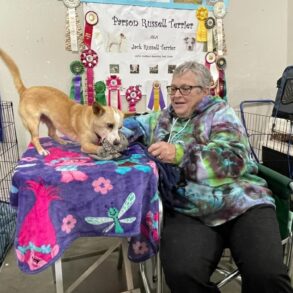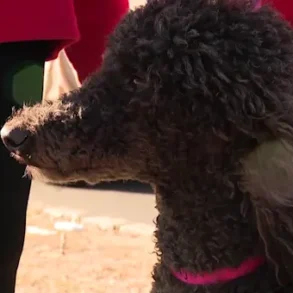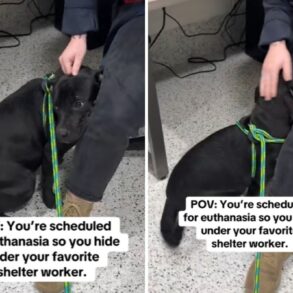
Care and Feeding is Slate’s parenting advice column. Have a question for Care and Feeding? Submit it here.
Dear Care and Feeding,
Eight months ago, I—a 40-year-old woman—moved in with my parents due to their health issues and their need for more assistance. They have a dog, “Rover,” who is 15 years old and blind and deaf (due to age; he hasn’t always been). I know I’m about to come across as a horrible person, but please hear me out. (I promise, I truly love animals!) It is time for this dog to be put down.
I need help navigating this. Based on conversations with my parents, I knew Rover was declining before I moved in, but I didn’t know the extent of it until afterward (they’d made it sound like he was just getting old, but overall was fine). First of all, Rover cannot be left alone. Due to his loss of sight and hearing, and also likely some cognitive dysfunction, he hurts himself if he’s left to wander around the house alone. My parents refuse to crate him because, they say, he’s never been in a crate before and it’ll just freak him out. If he’s set down on their bed and they shut the bedroom door, he will stay there, but he needs to be carried up the stairs to the bedroom, and because of his size and their limited capabilities, they don’t want to carry him up and down multiple times a day. So they basically both can’t leave the house if I’m not home. I am certainly willing to help out here and there if they want to go out, but I have a full-time job and a social life! The other day they got upset because they got a phone call in the afternoon from friends asking if they could come to dinner, but I already had plans and I wouldn’t cancel them.
Within the last few weeks, Rover has been going to the bathroom in the house a lot. It’s a combination of his losing strength in his legs and just forgetting he has to wait to go outside. We did take him to the vet, who said Rover is not in pain, but that it’s time to think about putting him down because his mental state is just going to keep deteriorating. My parents were horrified at the suggestion. They said he was fine: He’s still eating and drinking normally.
I can’t take this anymore. I know how hard it is to put down a pet, but they are being delusional. I’m actually fantasizing about waiting for a time when they’re both out, and I take Rover to be put down and claim he had a medical emergency (I won’t do that). I’m afraid I’m going to snap at them and tell them they’re being cruel, terrible people for keeping him alive. Please help me craft a conversation I can have with them to help them make this decision!
—All Dogs Go to Heaven
Dear Heaven,
I don’t think I can (or want to) help you craft that conversation. Euthanizing a beloved pet is a painful decision, and it’s one your parents will have to come to on their own. Because Rover is not in pain—as per the vet, and your parents’ own observations of their dog—ending his life at this point would not be for his sake as much as for theirs (and yours). They don’t want to do that, and I don’t blame them. (Full disclosure: I had a dog for 16-plus years whom I loved and who’d been devoted to me since her earliest puppyhood, and in the last months of her life, when she became too frail to climb the stairs at bedtime or be safely left alone at home, I slept beside her in the living room and stopped going anywhere during the day and evenings. Like Rover, she was not in pain, and she still enjoyed her ever-shorter walks around the neighborhood.)
But he’s their dog, not yours, and you need to find a way to gently tell them that although you moved in with them to take care of them, you weren’t bargaining on this level of care for their elderly dog. (I do wonder what your agreement with them was. In what ways did you volunteer to help them out? Was moving in with them your idea or theirs? Did you all talk about what day-to-day life would be like once you were installed in their house?) Given that they were miffed that you wouldn’t change your plans for them, it seems their assumption was that you’d do whatever they needed/asked you to do. I’d get all this straightened out sooner rather than later, because the dog is not going to be the last of these conflicts. As time passes, their own needs for care will be greater.
But while they may be being a bit delusional where their expectations/demands of you are concerned, I don’t think they’re being delusional about Rover. Their vet has told them to start thinking about what’s ahead. I can’t imagine they’re not doing that: They know he won’t live forever. I remember that as my Molly grew frailer, well-meaning friends told me that I was waiting for “the right time” to let her go but that the right time never comes—it’s always too early or too late. They thought I was delusional, I’m sure, when I told them I’d know. But I did know. I think you need to let your parents come to this moment themselves. And in the meantime, they may have to make some sacrifices on Rover’s behalf.
Get parenting and family advice—submit a question!
Please keep questions short (150 words), and don‘t submit the same question to multiple columns. We are unable to edit or remove questions after publication. Use pseudonyms to maintain anonymity. Your submission may be used in other Slate advice columns and may be edited for publication.
Dear Care and Feeding,
I have a problem with my brother-in-law. Or maybe I should say he has a problem with me. He stayed out of the last election, and at family gatherings when I’ve mentioned how neutrality helped Trump to win (especially here, since we’re in a swing state), he’s responded that he couldn’t support a Democrat this election. We’ve argued since November, and at this point, he pulls out of any family gathering I’m going to be at.
All of that would be unfortunate, but manageable. But my son is close with his cousin. And with my brother-in-law feuding with me, it makes it very hard for our sons to hang out. Worse, my son keeps asking why he can’t go over to his cousin’s house, and why he never visits us anymore. He’s only 7. I don’t want to burden him with collateral from arguments between adult family members. But he does keep bringing it up. What do I say? What do I do?
—Fallout Problems
Dear Fallout,
Has your brother-in-law told you he doesn’t want the kids to spend time together? Do you want the kids to stay close even if your brother-and-law are now, in effect, estranged?
I would hope that neither of you is choosing to intentionally sever the connection between the cousins, and that, as angry as you both are, you would prefer not only that the children not suffer fallout from your falling out with each other, but that you want to serve as good examples to your children and to let them know that their needs, emotions, and relationships matter to you. The kids would benefit from seeing that people can disagree—even heatedly and passionately disagree—without burning down everything and everyone around them. Arranging for the cousins to get together might be tricky now, but surely it is not impossible. You—or, if necessary, another family member or a sitter—can drop your son off for a playdate, then return to pick him up; Your brother-in-law—again, or someone else—can likewise drop off his kid. The children’s other parents—or their grandparents, or another aunt or uncle or family friend—can pick up both kids and take them somewhere to play. I can think of plenty of ways to nurture the relationship between cousins that don’t require you and your brother-in-law to interact.
That said, I think you are both begging for trouble. I wouldn’t have “mentioned” what you did at a family gathering if I knew my brother-in-law had sat out the election. (I do not shrink from conflict—as members of my own family can tell you—but bringing this up in a roomful of people who love you both, and whom both of you love in turn, seems passive-aggressive to me.) If you’ve been fuming since the election about his decision not to vote, the healthy thing to do would have been to tell him so directly, and in private. And if the thought of that made you nervous, you’d have done better to keep your own counsel. But once you said what you did (and not once, it seems, but many times), you opened the can of worms: It’s not fair to fault him for explaining himself, even if you disagree with his reasoning. As to your brother-in-law: Refusing to attend family functions because he doesn’t want to be around you is childish. I would love to know what your sibling, his child’s other parent, thinks/feels about this. The political divide is fracturing families all over the U.S. (there’s been some fracturing in my own family, which is heartbreaking to me) and sometimes, I know, it’s inevitable, even necessary. But I would do everything in my power to keep this from happening. Letting these two little boys continue to see each other is a small thing you can do with a big impact.
Send Your Questions to Good Job!
Laura Helmuth and Doree Shafrir want to help you navigate your social dynamics at work. Does your colleague constantly bug you after hours? Has an ill-advised work romance gone awry? Ask us your question here!
Dear Care and Feeding,
This is a low-stakes question but it’s driving me crazy! My 3.5-year-old will not wipe her own nose when it’s dripping. She just yells, “My nose is runny!” over and over until an adult wipes it. A year ago, she was perfectly capable of wiping her own nose, but now she has some sort of block against it. She’s been sick for the last week, so it’s happening every couple of minutes all day long right now, and the constant shrieking and complete inability to handle it herself is maddening. When my partner or I try to get her to do it, or even to do it with one of us, she will just scream and say she can’t and that she needs a grown-up to do it for her. She legitimately freaks out at the mere suggestion that she hold a clean tissue in her own hands (I’m talking backflipping away from it). How in the world do we get her to wipe her own nose? I’ve even tried bribing her but it was a no-go.
—I’m Not Your Tissue
Dear Tissue,
I’d bet the ranch (if I had a ranch; all I’ve got is a 100-plus-year-old wood-frame house that needs painting, and a small square of yard full of wildflowers) that there is context missing from this question. Kids this age regress in all kinds of ways in response to situational changes. They sleep through the night, night after night—until they don’t. They eat anything you put in front of them—until suddenly they turn into picky eaters, refusing anything but bread and bananas. Most often, it passes. But these regressions don’t come out of nowhere. A new baby is on the way. Day care or preschool has begun—or the hours they spent there have gotten longer. A parent is working more than they had before. There’s been a change of schedule, sitters, or day care facilities. A move. A death in the family.
I don’t know what’s changed for your child, and I’m not sure it matters as much as your patience and sensitivity toward her do. But thinking through what might have caused her to want to be a baby again (because that’s what not wiping her own nose signifies) should help you figure out how to put her at ease and reassure her that whatever is happening, you will always be there to take care of her. Whatever factors are at work here—and whether you can pinpoint them or not—try responding less to the symptom (or, if you will, the objective correlative), the “wipe my nose for me,” and more to the thing itself (i.e., her not wanting to “grow up”). Give her some extra (non-nose-related) attention, cuddle her, and find other ways to let her know that she’s your baby no matter how old she gets to be. Don’t keep pointing out that she used to be able to handle this task herself, or let your irritation get the better of you.
If you can’t wipe her nose for her (for the time being—because, I promise, this phase will pass; she will start wiping her own nose again soon enough) without being driven mad about it, then don’t wipe her nose. Natural consequences will eventually force her to do it herself. I probably don’t have to tell you that this would not be my way of dealing with the situation—that I’d just go ahead and keep wiping her nose for now. But there is no one right way to care for our children, and if nose-wiping is a bridge too far for you, I don’t fault you for it. We all draw the line somewhere. I would say, though, that if your goal is to move through this phase quickly, you will want to draw as little attention to it as possible. Which means no bribes, no remonstrations, no bargaining. And a box of tissues in her room and in every room she plays in.
—Michelle
More Advice From Slate
I have a 2-year-old daughter who is lucky to have two sets of grandparents who love and adore her. However, my mother-in-law will occasionally try to emotionally manipulate my daughter, and I’m not quite sure how to address it. She knows we don’t want to force hugs or physical interaction, and I think she tries to respect it. But she will say things like “That makes me sad.”
This post was originally published on this site be sure to check out more of their content.









































